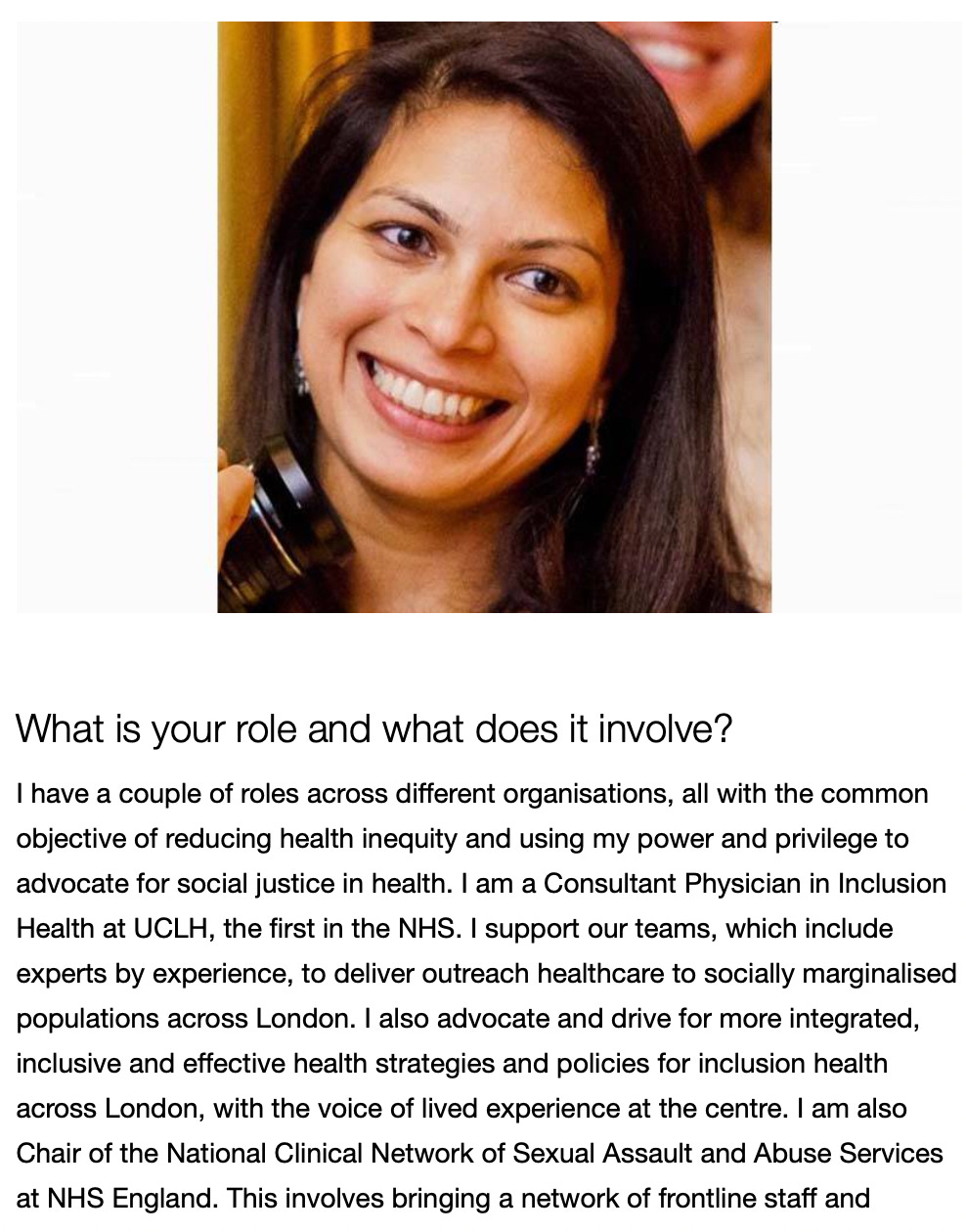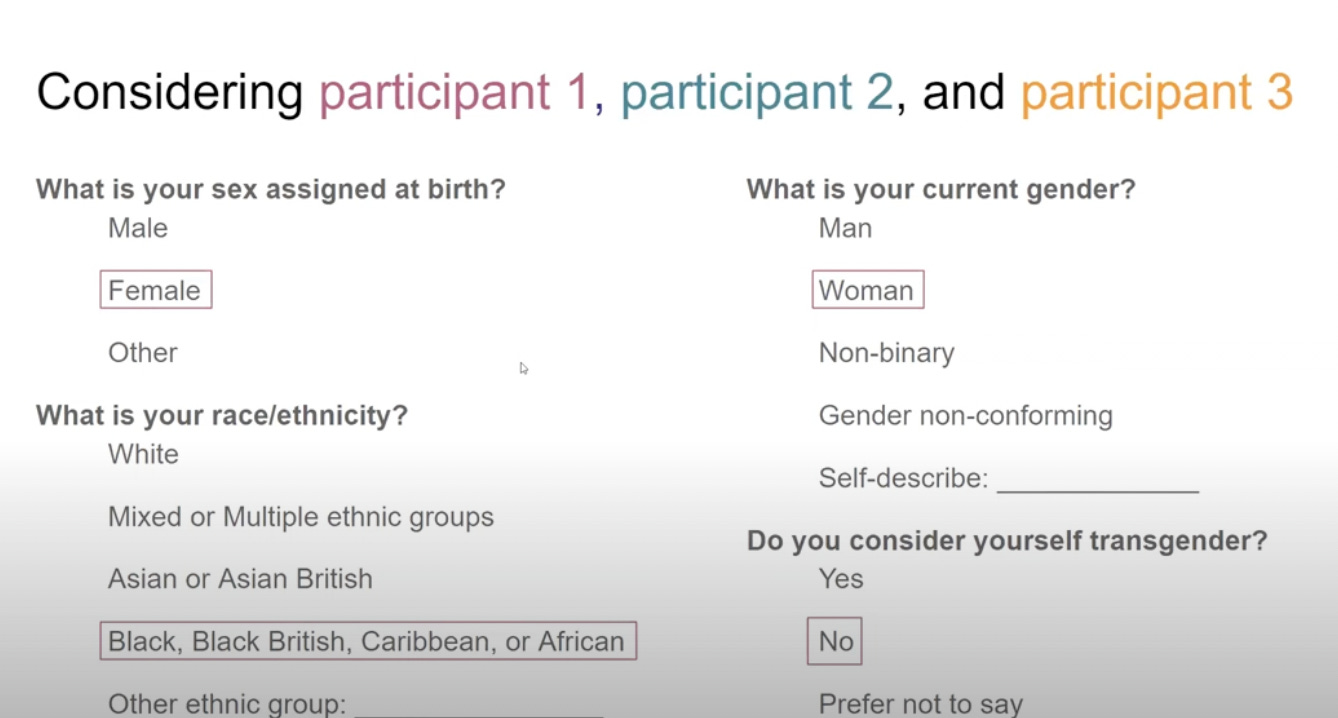"The need to have binaries within our systems" is problematic, says NHS Chair for Sexual Assault and Abuse Services
Dr Binta Sultan also believes clinicians should "ask people how they want to be identified"
Please consider a paid subscription if you would like to support my Woke Waste series and other investigative features. I like to keep as many posts free as possible to grow public awareness, but paid subscribers give me the bandwidth to explore areas in depth as much as possible. Thanks for all your support so far.
Earlier this month UCL hosted an event titled Intersectionality in Inclusion Health: Why Does Gender Matter?
The panel included Dr Binta Sultan, Grace Sumner, Kate Luxion, the latter famous for going on BBC - to argue that “trans milk” is just as good as normal breast milk.
Sumner, introduced by Chair Serena Luchenski from UCL’s Collaborative Centre for Inclusion Health, works in “women’s homeless health, partially inspired by her own lived experience of homelessness and sex work”.
Later Sumner tells the panel she was “born intersex, assigned male at birth, raised female”:
Dr Binta Sultan
Sultan is a Consultant Physician in Inclusion Health at UCLH (“the first in the NHS”).
She holds a number of other roles, crucially for this piece, she is “Chair of the National Clinical Network of Sexual Assault and Abuse Services at NHS England.”
After introducing her job titles, Sultan says she’s “a brown cisgendered Muslim woman” (4.43 mins) - “cisgendered woman” being exactly the term you want from someone paid to deal with biological reality.
Gender data
Here’s the important bit.
Around 27 minutes into the discussion, Luchenski asks what researchers should do “when data is lacking” for certain communities (marginalised ones).
Of her own research into homelessness, Luchenski says: “I only have data that categorises people as male or female… this is the binary sort of categorisation that I’ve got to work with. What do we do when we don’t have the data?”
Luxion, who by this point, has already talked the group through this form (below), naturally believes that categories are too rigid.
Luxion believes that sex and gender identity are separate, and that data is poorer for not reflecting this. For instance, if a female is only asked her sex, she cannot say if she’s cisgender or transgender.
A small snippet of Luxion (coming to the end of her thoughts on this subject) - to provide context to what Sultan says afterwards:
Sultan:
Full Text:
“I have very strong views on this and I think it’s not a problem. I think the problem is the lack of comfort with nuance and complexity, and the need to have binaries within our systems and that’s the problem.
"I don't think it's a problem to have more [gender] categories and ask people how they want to be identified, right? It’s not difficult. As a clinician it’s not a difficult thing and if someone chooses not to answer that’s fine as well, right? It’s giving people the opportunity to share what they want. And I don’t think it’s a problem. I think the problem is our systems just want ‘yes’ or ‘no’ answers. And we can do a lot more to get comfortable with complexity and nuance.”
Why does this matter?
Aside from being a consultant physician, where you might expect someone to acknowledge the “binary” of biological sex, Sultan is - to repeat - Chair of the National Clinical Network of Sexual Assault and Abuse Services at NHS England.
It is clearly a role that demands a full grasp of the threat males can pose to females. But here we have someone who seems to think it’s a bit “old fashioned”/ “backwards” to believe in gender binaries, as though this were akin to, say, believing people should get married before they have children.
Recording sex means you don’t get “nuance and complexity”, she appears to think - despite warning last year that “inequality and sexual misconduct… is experienced disproportionately by our female colleagues across the NHS.”
Sultan had been interviewed in the newspapers after an analysis of surgeons found a widespread pattern of female trainees being abused by senior male colleagues. Hospital trusts and GP surgeries were urged to sign up to a new NHS “sexual safety charter” as a result and it was called a “MeToo moment” for surgery.
Here’s what Sultan had to say:
"No one should experience sexual abuse or assault in the workplace but unfortunately, we know inequality and sexual misconduct exists and is experienced disproportionately by our female colleagues across the NHS.
"While this report makes incredibly difficult reading, it presents clear evidence of why we must take more action to better understand and address these issues.
"We are committed to working with our partners to ensure that healthcare environments are safe for all staff and patients. We are already taking significant steps to do this, including through commitments to provide more support and clear reporting mechanisms to those who have suffered harassment or inappropriate behaviour, thanks to a first of its kind sexual safety charter, which was produced collaboratively with people with lived experience."
But now we know she thinks the “need to have binaries within our systems” - defining people as male or female - is a “problem”.
How can the National Clinical Network of Sexual Assault and Abuse Services offer leadership here or even begin to provide “clear reporting mechanisms” when Sultan thinks “we can do a lot more to get comfortable with complexity and nuance” (aka doctors recording gender identities for patients)?
The very fact that she uses “lived experience” should raise alarm bells in itself - a pseudoscientific term that has proliferated across the public sector, to essentially mean “feelings triumph fact”. Experience does not need the qualifier “lived”, nor do biological categories need “nuance”, nor does the NHS - and especially not the Chair of the National Clinical Network of Sexual Assault and Abuse Services - need personnel who do not understand this.





As long as the NHS employs people in fantasy roles such as this its persistent claims to being underfunded should be met with a hollow laugh.
If I were the new CEO of the NHS, this role would be on my list for Day 1 cuts. Afuera!